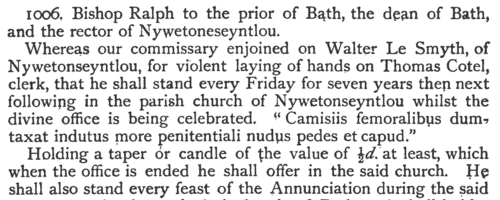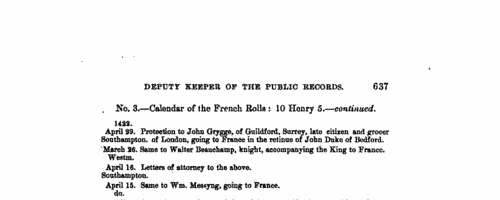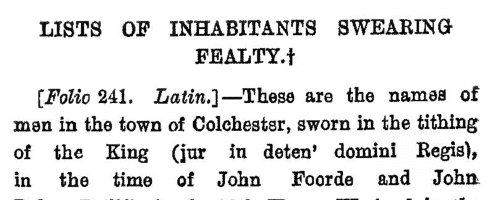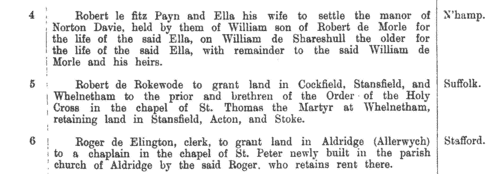Artour Surname Ancestry ResultsOur indexes 1000-1999 include entries for the spelling 'artour'. In the period you have requested, we have the following 10 records (displaying 1 to 10): Buy all | | | Get all 10 records to view, to save and print for £52.00 |
These sample scans are from the original record. You will get scans of the full pages or articles where the surname you searched for has been found. Your web browser may prevent the sample windows from opening; in this case please change your browser settings to allow pop-up windows from this site. Clerks and Clergy in Cornwall and Devon
(1307-1326)
The register of bishop Walter de Stapeldon of Exeter, containing general diocesan business, but in particular including ordination lists for monks and clergy. Only a small proportion of the clerks went on to acquire benefices and remained celibate. LatinARTOUR. Cost: £6.00.  | Sample scan, click to enlarge

| Clerks and Clergy in Somerset
(1329-1363)
The register of bishop Ralph de Salopia or Shrewsbury of Bath and Wells, containing general diocesan business, mostly relating to clergy, but with some parochial affairs and disputes with names of parishioners. The diocese of Bath and Wells at this period was almost exactly coextensive with the county of Somerset. ARTOUR. Cost: £4.00.  | Sample scan, click to enlarge

| London, Essex and Hertfordshire clerks, clerics, monks and clergy
(1361-1374)
Ordinations to first tonsure, acolytes, subdeacons, deacons and priests, from the register of bishop Simon de Sudbury of London. London diocese covered Middlesex, Essex and part of Hertfordshire; the ordinations also attracted many persons from distant dioceses bearing letters dimissory from their ordinaries, and these are duly noted in the text. Many of these clerks would not go on to obtain benefices and remain celibate. The lists of subdeacons, deacons and priests state the clerks' respective titles, i. e., give the names of the person or religious house undertaking to support them. Monks and friars ('religious') are listed separately, and the lists of subdeacons, deacons and priests are also separated into beneficed and not beneficed (or 'not promoted'). The acolyte lists are unusual in giving a parish or diocese of origin.ARTOUR. Cost: £6.00.  | Sample scan, click to enlarge

| Devon and Cornwall clerks, clerics, monks and clergy
(1370-1382)
Ordinations to first tonsure, acolytes, subdeacons, deacons and priests, from the register of bishop Thomas de Brantyngham of Exeter. Exeter diocese covered the counties of Cornwall and Devon. Some of these clerks would go on to obtain benefices and remain celibate. The lists of subdeacons, deacons and priests state the clerks' respective titles, i. e., give the names of the person or religious house undertaking to support them. Monks and friars ('religious') are bracketed separately as such.ARTOUR. Cost: £6.00.  | Sample scan, click to enlarge

| The English in France
(1415-1416)
King Henry V of England claimed the throne of France (and quartered the fleurs-de-lis of France with the lions of England on the royal standard) as had his predecessors since Edward III, as descendants of Philip IV of France. He married Katherine, youngest daughter of king Charles VI of France in 1420, and thereafter styled himself 'heir and regent of France'. The English had real power or influence in Brittany, Normandy, Flanders and Gascony, and actual possession of several coastal garrisons, in particular Calais, where the French inhabitants had been replaced by English. The English administration kept a series of records called the French Rolls. On these are recorded royal appointments and commissions in France; letters of protection and safe-conduct to soldiers, merchants, diplomats and pilgrims travelling to France from England and returning, and to foreign legations. There are also licences to merchants to export to the Continent, and to captains to transport pilgrims. This calendar of the French Roll for the 3rd year of the reign of Henry V (21 March 1415 to 20 March 1416) was prepared by Alexander Charles Ewald and published in 1883. The battle of Agincourt took place on 25 October 1415, so this roll has many letters of protection for soldiers, and various letters and orders relating to the ransoming of French prisoners.ARTOUR. Cost: £6.00.  | Sample scan, click to enlarge

| Close Rolls
(1441-1447)
The close rolls of the 20th to 25th years of the reign of king Henry VI record the main artery of government administration in England, the orders sent out day by day to individual officers, especially sheriffs of shires: they are an exceptionally rich source for so early a period. There is also some material relating to Wales, Scotland, Ireland and the English possessions in France. ARTOUR. Cost: £4.00.  | Sample scan, click to enlarge

| Close Rolls
(1447-1454)
The close rolls of the 26th to 32nd years of the reign of king Henry VI record the main artery of government administration in England, the orders sent out day by day to individual officers, especially sheriffs of shires: they are an exceptionally rich source for so early a period. There is also some material relating to Wales, Scotland, Ireland and the English possessions in France. ARTOUR. Cost: £4.00.  | Sample scan, click to enlarge

| 'Foreigners' in Colchester (1458)
'Foreigners', i.e. non-burgesses, living in Colchester, Essex, swearing fealty to the Crown, as recorded in the Red Paper Book.
ARTOUR. Cost: £6.00.  | Sample scan, click to enlarge

| Landowners and tenants in Dorset
(1345-1485)
Inquisitions ad quod damnum were held by the appropriate sheriff or escheator (or other officer in whose bailiwick the matter in question might lie) to investigate cases in which the royal or public interest might be damaged by proposed alienation or settlement of land (especially alienation to religious uses, into mortmain). The key findings from these inquisitions were as to the tenure of the land and the service due from it; its yearly value; the lands remaining to the grantor, and whether they sufficed to discharge all duties and customs due from him; and whether he can still be put upon juries, assizes and recognitions, so that the country be not burdened by his withdrawal from them. Generally speaking, this process had the makings of a system of licensing such alienations, and raising money in proportion to the valuations. Equally, there are many items that deal with subjects such as the closing of public roads, the felling or inclosing of woods, or the proposed grant of liberties or immunities. A calendar of these inquisitions from the 19th year of the reign of king Edward III to the 2nd year of Richard III was prepared by the Public Record Office and published in 1906. We have now indexed this calendar by surname and county. Most of the individuals appearing in the calendar are either pious individuals seeking to make grants to religious bodies for the sake of their souls; or landowners securing the disposition and settling of their real estate. But some other names do appear - tenants, trustees, chaplains and clerks.ARTOUR. Cost: £6.00.  | Sample scan, click to enlarge

| Somerset testators and legatees
(1501-1530)
Somerset was almost coextensive with the diocese of Bath and Wells, which exercised local probate jurisdiction through its consistory and archdeaconry courts: but superior to the diocese was the province of Canterbury. Somerset testators who also had property outside the county had their wills proved in the Prerogative Court of Canterbury (PCC). The Somerset Record Society embarked on a program of publishing genealogical abstracts of the registered copy wills of Somerset testators in the PCC archives, and in 1903 (volume xvi) printed abstracts edited by the Reverend F. W. Weaver from the PCC registers 1501-1503 (register Blamyr), 1504-1506 (Holgrave), 1506-1508 (Adeane), 1508-1511 (Bennett), 1511-1514 (Fetiplace), 1514-1517 (Holder), 1517-1520 (Ayloffe), 1520-1522 (Maynwaryng), 1523-1525 (Bodfelde), 1525-1528 (Porch) and 1529-1530 (Jankyn). In addition, the volume includes abstracts of 48 Somerset copy wills in the registers of the Archbishops of Canterbury at Lambeth Palace Library from 1363 to 1491. The heading of each abstract gives the year of making the will (not the year of probate) and the testator's name in bold. Below that is the quire number and name of the PCC register. Date and details of probate are given at the foot of each abstract. Spellings of surnames are preserved as they appear in the registered copy wills, and may vary within a single document.ARTOUR. Cost: £4.00.  | Sample scan, click to enlarge

|
Research your ancestry, family history, genealogy and one-name study by direct access to original records and archives indexed by surname.
|












